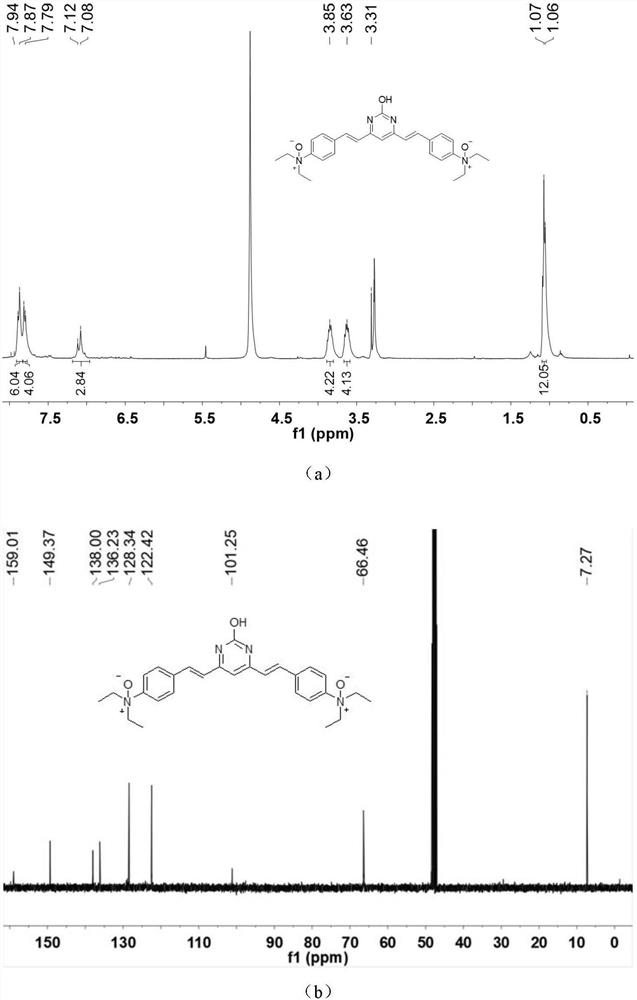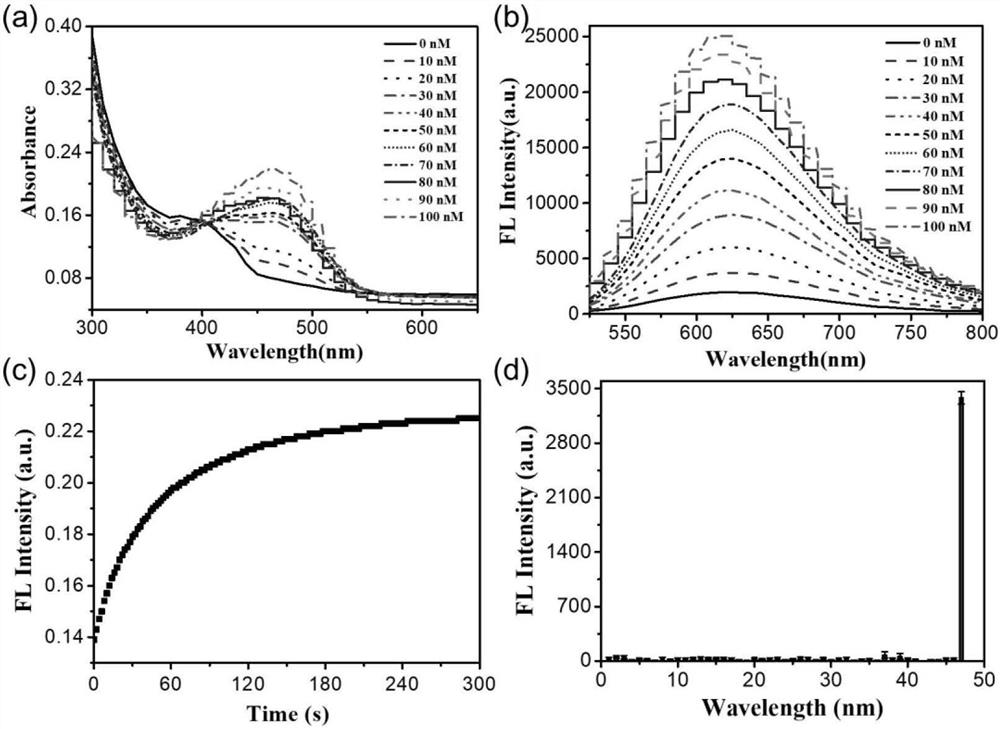A method for detecting fe in vivo 2+ Two-photon fluorescent probe and its preparation method and application
A two-photon fluorescence and fluorescent probe technology, which is applied in the fields of fluorescence/phosphorescence, chemical instruments and methods, luminescent materials, etc., can solve the problems of high price, affecting the imaging effect of probes, and limitation of penetration depth, etc.
- Summary
- Abstract
- Description
- Claims
- Application Information
AI Technical Summary
Problems solved by technology
Method used
Image
Examples
Embodiment 1
[0043] A novel method for detecting Fe in living organisms 2+ The preparation method of the two-photon fluorescent probe is as follows:
[0044] 1. Preparation of pyrimidin-based dye DEt
[0045] Dissolve 4-fluorobenzaldehyde, potassium carbonate, diethylamine, and Aliquat-336 in DMF, and stir at 95°C for 12h. The reacted solution was dissolved in ethyl acetate and washed with water. Anhydrous sodium sulfate was used to remove water, and purified by silica gel chromatography to obtain DEt-a.
[0046] Dissolve DEt-a in ethanol, ultrasonically dissolve the solid, stir and add concentrated hydrochloric acid, and reflux at 95°C for 24h. After the reaction, the solution was poured into ice water and neutralized by adding sodium bicarbonate. use CH 2 Cl 2 After extracting twice, dry the organic phase with anhydrous sodium sulfate, remove anhydrous sodium sulfate and organic solvent, and obtain the dye DEt by silica gel chromatography.
[0047] 2. Preparation of probe PyFe
...
Embodiment 2
[0052] A novel method for detecting Fe in living organisms 2+ The preparation method of the two-photon fluorescent probe is as follows:
[0053] 1. Preparation of pyrimidin-based dye DEt
[0054] Dissolve 4-fluorobenzaldehyde, potassium carbonate, diethylamine, and Aliquat-336 in DMF, and stir at 95°C for 14h. The reacted solution was dissolved in ethyl acetate and washed with water. Anhydrous sodium sulfate was used to remove water, and purified by silica gel chromatography to obtain DEt-a.
[0055] Dissolve DEt-a in ethanol, ultrasonically dissolve the solid, add concentrated hydrochloric acid with stirring, and reflux overnight at 95°C. After the reaction, the solution was poured into ice water and neutralized by adding sodium bicarbonate. use CH 2 Cl 2 After extracting twice, dry the organic phase with anhydrous sodium sulfate, remove anhydrous sodium sulfate and organic solvent, and obtain the dye DEt by silica gel chromatography.
[0056] 2. Preparation of probe P...
Embodiment 3
[0061] A novel method for detecting Fe in living organisms 2+ The preparation method of the two-photon fluorescent probe is as follows:
[0062] 1. Preparation of pyrimidin-based dye DEt
[0063] Dissolve 4-fluorobenzaldehyde, potassium carbonate, diethylamine, and Aliquat-336 in DMF, and stir at 95°C for 20h. The reacted solution was dissolved in ethyl acetate and washed with water. Anhydrous sodium sulfate was used to remove water, and purified by silica gel chromatography to obtain DEt-a.
[0064] Dissolve DEt-a in ethanol, ultrasonically dissolve the solid, stir and add concentrated hydrochloric acid, and reflux at 95°C for 24h. After the reaction, the solution was poured into ice water and neutralized by adding sodium bicarbonate. use CH 2 Cl 2 After extracting twice, dry the organic phase with anhydrous sodium sulfate, remove anhydrous sodium sulfate and organic solvent, and obtain the dye DEt by silica gel chromatography.
[0065] 2. Preparation of probe PyFe
...
PUM
 Login to View More
Login to View More Abstract
Description
Claims
Application Information
 Login to View More
Login to View More - R&D
- Intellectual Property
- Life Sciences
- Materials
- Tech Scout
- Unparalleled Data Quality
- Higher Quality Content
- 60% Fewer Hallucinations
Browse by: Latest US Patents, China's latest patents, Technical Efficacy Thesaurus, Application Domain, Technology Topic, Popular Technical Reports.
© 2025 PatSnap. All rights reserved.Legal|Privacy policy|Modern Slavery Act Transparency Statement|Sitemap|About US| Contact US: help@patsnap.com



